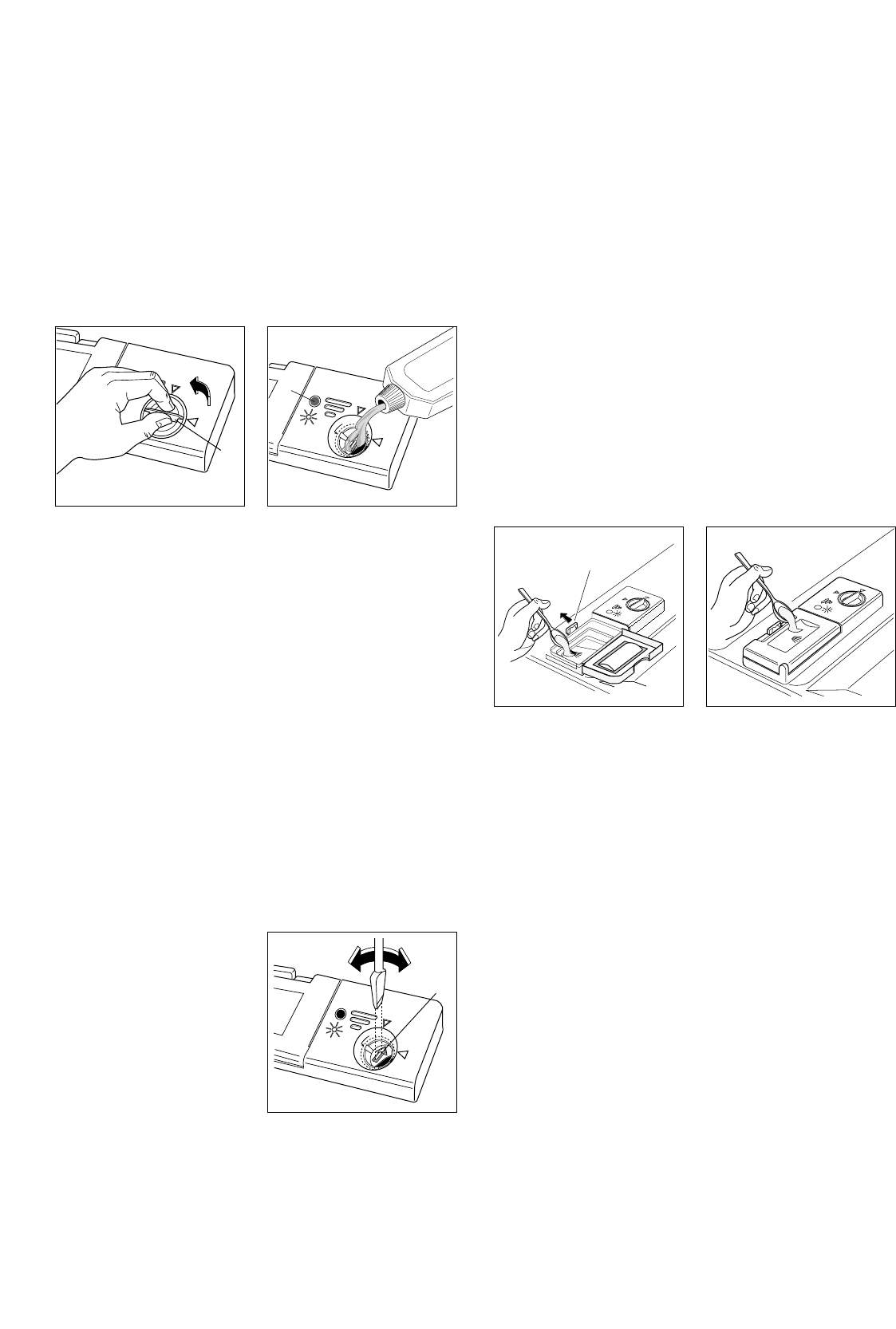
Rinse aid
Rinse aid is automatically added during the last rinse,
ensuring thorough rinsing, and spot and streak free drying.
The dispenser, which is positioned inside the door, holds
about 110 ml of rinse aid, which is sufficient for 16 - 40
dishwashing programmes, depending upon the dosage
setting.
Filling with rinse aid
1. Open the container by turning the lid (A) anticlockwise.
2. Add the rinse aid until the container is completely full.
The indicator (B) will be completely dark.
3. Top up the rinse aid when the indicator (B) becomes
clear.
(Only for models with rinse aid indicator light)
Top up with rinse aid when the rinse aid indicator light on
the control panel illuminates.
Ensure that the lid is closed after every refill.
Do not put liquid detergent in the rinse aid compartment.
Clean up any rinse aid spilt during filling with an absorbent
cloth to avoid excess foaming during the next wash.
Adjusting the dose
According to the finish and drying results obtained, adjust the
dose of rinse aid by means of the 6 position selector (C)
(position 1 minimum dosage, position 6 maximum dosage).
Increase the dose if there are drops of water or lime spots on
the dishes after washing.
Reduce it if there are sticky whitish streaks on the dishes.
Use of detergent
Only use detergents specifically designed for use in
dishwashers.
We recommend the use of Finish detergents which are
available in the following options:
Finish Double Action Tablets. Each tablet has the exact
amount of detergent required, simply place in the dispenser.
Finish Powder recommended for every day use.
Finish Liquid Gel ideal for every day use. As the gel is extra
gentle is it recommended for fine bone china.
If using powder detergents proceed as follows:
1. Open the dispenser lid by pulling the catch (D).
2. Add the detergent according to the recommended
quantity given in the "Washing programmes" chart
(see "Instruction Book - Part 2").
As all detergents are not the same, you should also
consult the instructions on the packet.
3. Always close the lid.
4. If the programme has a prewash add a little amount of
detergent over the lid of the dispenser. Follow the
recommended quantity given in the "Washing
programmes" chart (see "Instruction Book - Part 2").
If using detergent in tablets proceed as
follows:
1. For all programmes; place 1 tablet inside the detergent
dispenser.
2. Always close the lid.
3. For all programmes with prewash; place a portion of a
further tablet on the lid of the detergent dispenser.
If your dishwasher has a SID dispenser and you require a
prewash, put the extra detergent into the SID dispenser
and not on the lid of the detergent dispenser.
Insufficient quantities of detergent will produce poor
washing results, whereas an excessive amount of
detergent will not improve washing results and is also
wasteful.
Using no more than the correct amount also contributes
to reducing pollution.
Compact detergents with enzymes
In these compact powders the environmentally unfriendly
components have been replaced by natural enzymes and
other more biodegradable substances.
The enzymes deploy their full dirt dissolving power at a
temperature as low as 50°C.
By choosing the 50°C programmes (if available) you can
therefore achieve the same cleaning results that would
otherwise be achievable only with 65°C programmes and
conventional detergents.These new compact powders are
generally phosphate-free.
3
BR01
A
m
a
x
6
5
4
3
2
1
B
BR03
BR02
C
m
a
x
6
5
4
3
2
1
D
M
IN
M
A
X
DE17
Min = 15 g
Max = 30 g
DE02


















